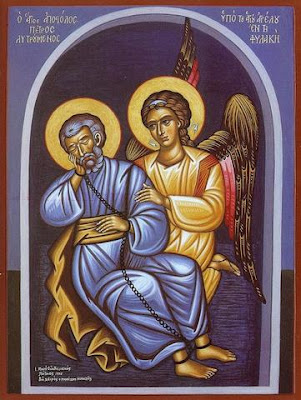
Gaudeamus omnes in Domino , diem festum celebrantes sub honore beate Mariae Virginis: de cujus Assumptione gaudent Angeli et collaudant Filium Dei. (Introit)
The feast of the Assumption is of double rite with an Octave. The liturgical colour of the feast, and Octave, is white. The tenth Sunday after Pentecost is commemorated in the Office and at Mass.
At first Vespers yesterday afternoon the antiphons Assumpta est Maria etc were sung with Pss. 109, 112, 121, 126 & 147. The Office hymn was Ave maris stella. After the collect of feast a commemoration of the Sunday was sung, the antiphon on the Magnificat being Omnis sapientia for the Sunday before the third Sunday of August. At Compline Te lucis was sung with the melody and Doxology of the Incarnation Gloria tibi Domine etc.
At Mattins the invitatory, Venite, adoremus Regem regum, Cujus hodie ad aethereum Virgo Mater assumpta est in caelum, is proper to the feast. The Office hymn is Quem terra, pontus. In the first nocturn the antiphons Exaltata est etc are sung with psalms 8, 18 & 23. The lessons in the first nocturn are taken from the Incipiunt of the Canticle of Canticles. These are the same as those found in later editions of the Breviary until the 1950s when this most venerable of Offices was destroyed by wicked men. In the second nocturn the antiphons Specie tua etc are sung with psalms 44, 45 & 86. The lessons are from a sermon of St. Athanasius. The more familiar texts from St. John Damascene appear in the Clementine edition of the Breviary. In the third nocturn the antiphons Gaude, Maria virgo etc are sung with psalms 95, 96 & 97. The homily on St. Luke's Gospel is from St. Augustine's 27th Sermon on the Words of the Lord. These are the same as those found in the post-Clementine editions. Today the eighth and ninth lessons are read together to form an extended ninth lesson and the ninth lesson is formed from the three lessons given for the homily of the Sunday. These are from a homily of St. Augustine on St. Luke's Gospel and are considerably longer than those found in post-Clementine editions so the text of the ninth lesson (appointed for the Sunday) is now entirely absent the modern editions. The Te Deum is sung.
At Lauds the antiphons Assumpta est Maria etc are sung with psalms 92, 99, 62-66, Benedicite and 148-149-150. The Office hymn is O gloriosa Domina. After the collect of the feast a commemoration of the Sunday is sung.
At Prime and the Hours the hymns are sung with the proper Doxology and tone, Gloria tibi Domine etc. In the short responsory at Prime Qui natus es de Virgine is sung, both today and throughout the Octave, and the lectio brevis is In plateis.
Mass is celebrated after Terce. The Mass formulary, Gaudeamus, is a particularly beautiful set of texts. The Gloria is sung. The second collect is of the Sunday. The Epistle is a sublime cento from the Book of Wisdom that also forms the chapters at the Office. The gradual Propter veritatem is very ancient. The Credo is sung, the preface is of the BVM and the last Gospel is of the Sunday.
In the afternoon at second Vespers all is sung as at first Vespers except the antiphon on the Magnificat which today is Hodie Maria Virgo caelos ascendit: gaudete, quia cum Christo regnat in aeternum. After the collect of the feast a commemoration of the Sunday is sung.
Icon: The Dormition by Theophanus the Greek, 14th century.




